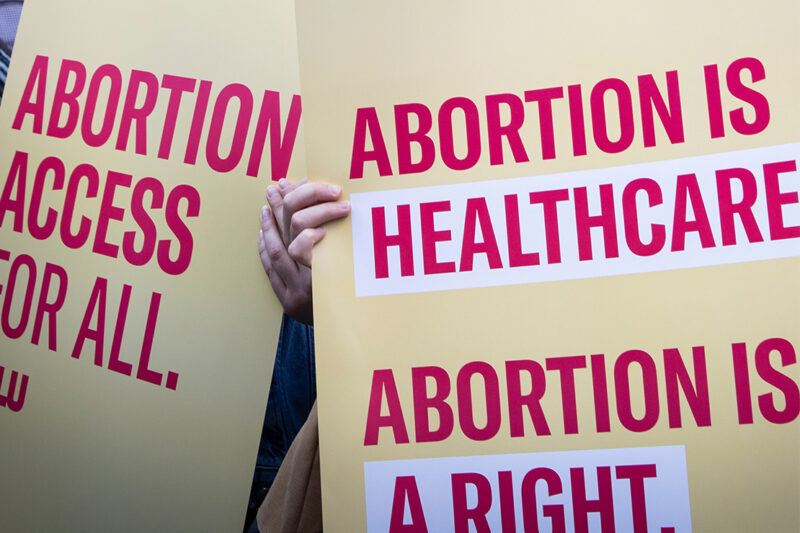North Carolina Has Spent Decades Attacking Abortion Access. We’re Fighting Back.


For years, North Carolina has restricted whether, when, and under what circumstances someone may obtain an abortion through a web of onerous and medically unnecessary laws. People with lower incomes seeking abortion care in North Carolina are frequently caught in a vicious cycle where delays in accessing care increase costs associated with the procedure, and increases in costs cause further, unnecessary delays. This burden is most by North Carolinians of color: 1 in 5 Black people, 1 in 5 Latinx people, and 1 in 4 Native American people in North Carolina are living in poverty.
Today we’re in court as part of a lawsuit the ACLU, the ACLU of North Carolina, Planned Parenthood, and the Center for Reproductive Rights filed in September. This lawsuit was filed on behalf of SisterSong Women of Color Reproductive Justice Collective and five abortion providers in the state to challenge five laws that restrict access to abortion.
The barriers to abortion access we are fighting to strike down include:
- a law prohibiting qualified medical professionals from providing abortion;
- a ban on the use of telehealth for medication abortions;
- a statute that places onerous, unnecessary restrictions on abortion providers but not on other similar medical offices or providers;
- a mandatory 72-hour waiting period between the patient’s consultation with their provider and when they can actually have the abortion; and
- a requirement that forces abortion providers to read a state-issued script to their patients discouraging and stigmatizing abortion care.
None of these restrictions have a medical benefit.
For example, banning qualified medical professionals, like physician assistants, nurse practitioners, and others (collectively referred to as "advance practice clinicians"), from performing abortion serves only to make accessing care more difficult — and does nothing to make it safer. Advance practice clinicians perform virtually identical procedures as abortion and prescribe medications used for abortion in other contexts, such as miscarriage care. But North Carolina categorically bans these clinicians from providing this very same care in the context of abortion without any logical justification.
Similarly, telemedicine is routinely used throughout North Carolina and is not categorically banned in any context other than medication abortion. As reaffirmed during the COVID-19 pandemic, in states where it is permitted, telemedicine for medication abortion is a safe, effective, and crucial way for patients to access health care. But North Carolina law unnecessarily requires the prescribing clinician to physically hand the patient the first set of pills necessary for a medication abortion — and requires patients to travel in person to a clinical setting to pick up the medication, even though they could potentially get it by mail or at a pharmacy. There is no health or safety justification for banning the use of telemedicine for medication abortions.
North Carolina law also singles out abortion providers, subjecting them to onerous and medically unjustified requirements that no other providers of office-based medical care must meet. This interferes with — and in some cases outright prevents — the provision of abortion services.
Furthermore, the state’s 72-hour mandatory delay, one of the longest in the country, pushes patients seeking abortion care to obtain that care later in pregnancy. This delay is premised on the unsupported belief that patients are unable to make a reasoned, informed decision about their own health without state mandates. It prevents some from accessing the abortion method the patient and their doctor have determined is best for them — and others from obtaining care altogether. And while abortion is extremely safe, this delay can increase both the risks and expenses related to the procedure.
Finally, the biased counseling requirement undermines core principles of informed consent and medical ethics by requiring the same state-scripted counseling for every abortion patient, regardless of circumstance. North Carolina law already requires health care professionals to obtain informed consent before every medical procedure. But once again, the state singles out abortion — and only abortion — for additional requirements that have no medical justification.
There is only one reason for this web of laws to exist: to make it more difficult to access abortion care and further stigmatize people who need it. The laws interfere with patients’ bodily autonomy; they restrict a person’s right to decide whether and when to bear a child; and they subject people who need abortions and their health care providers to discriminatory treatment that doesn’t apply to any other medical care in the state.
The ACLU is on the frontlines fighting new laws that restrict or altogether ban abortion. But we also need to dismantle unjust laws that have been on the books for years, and that have affected abortion access for generations, like in North Carolina.
This lawsuit is also noteworthy because we’ve sued under the North Carolina Constitution. In the post-Trump era — with the concern that the balance of the Supreme Court has shifted to an anti-abortion majority — states play an especially important role in protecting the right to abortion. Lifting the restrictions will reverberate across the Southeast, ensuring abortion access for people who live in neighboring Georgia, , Tennessee, and , which have been increasingly hostile to abortion access.
Enough is enough. It is time to end North Carolina’s decades of attacks on reproductive freedom.

